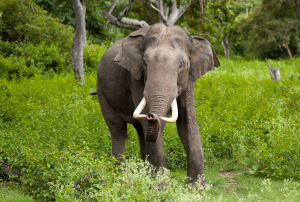Asian Young Male Elephants Prefer to be Solitary
As human-elephant conflicts increase with time and expanding human range, an effective understanding of the social behaviour of the gentle giants becomes crucial for their conservation and management.
the social behaviour of the gentle giants becomes crucial for their conservation and management.
The Asian elephant is a charismatic species with a long history of coexistence with humans. Yet works on societies of wild elephants based on long-term observations are rare.
To fill this gap, researchers from Jawaharlal Nehru Centre for Advanced Scientific Research (JNCASR), a Bengaluru-based autonomous Institute of the Department of Science and Technology, Government of India, studied how male Asian elephants associate among themselves. They used six years of field data on 83 animals from Nagarahole and Bandipur National Parks in Karnataka for this study. They identified the individual elephants using features of their ears, tails, and tusks.
An interesting finding of the study is that adult males spent greater proportions of their time solitarily rather than in mixed-sex or in all-male groups. Old (over 30 years) males were sighted more frequently with their age-peers and less frequently with their younger (15–30 years) counterparts than expected at random in all-male groups.
Also Read : India needs to prevent wildlife accidents to achieve goal 15 of the SDGs
These findings suggest that male associations among the old males were more intended for them to test their strengths against their age-peers than out of camaraderie.
The young males also did not seem to `disproportionately’ initiate associations with old males unlike in African savannah elephants. It seemed that social learning from older individuals was not important for young Asian male elephants for some reason. Another interesting finding was that all-male groups were rarer and smaller than those seen with African savannah elephants.
However, although in general male associations were weak, most males had a significant-top associate, with whom their association was the strongest.
In a paper published in the journal `Frontiers in Ecology and Environment’, the researchers said that differences in male social organization amongst Asian elephants from that of the related African savannah elephant that occupies a similar niche possibly arise from differences in ecology. “Studies on the foraging ecology of male elephants are required in the future to further understand the differences in social organization between species”, they noted.
The study was conducted by P.Keerthipriya, S.Nandini and T.N.C.Vidya of the Evolutionary and Organismal Biology Unit at Jawaharlal Nehru Centre for Advanced Scientific Research.
